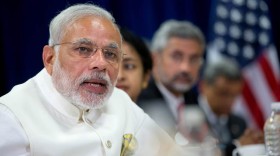
Prime Minister Narendra Modi speaks to members of the media following a bilateral meeting with President Barack Obama, Monday, Sept. 28, 2015, at United Nations headquarters. (AP Photo/Andrew Harnik)
This article was published in The Indian Express
By Tarun Khanna, Director of the South Asia Institute, Jorge Paulo Lemann Professor, Harvard Business School
That India should not be afraid might seem an odd thing to say at a time when Indians are brimming with confidence. After all, it is the only one of the original BRIC economies that has not disappointed expectations recently. And Prime Minister Narendra Modi has just concluded his successful week-long swing through the United States, with excited members of the Indian diaspora cheering him on.
But ultimately the prime minister came to office on a wave of enthusiasm for his pro-enterprise and “can do” attitude, along with a track record as chief minister of Gujarat that was generally seen as having delivered prosperity. That is one important dimension on which he’ll be judged as he leads the nation. And the most significant indicator for improved prosperity in India has to be net job creation. With roughly 10-12 million net additions to the workforce annually for the next decade, it is clear that no amount of optimisation of existing enterprises, public sector and otherwise, is going to deliver this. Net job creation must go hand in glove with net enterprise creation — that is, it must be delivered by entrepreneurship and innovation.
One could be forgiven for being swept away by the e-commerce enthusiasm in India these days, rather like in Silicon Valley, where Modi was so recently basking. The enthusiasm in the Valley and that in e-commerce in India is indeed fabulous to see. But it is just a smidgen of what is needed to generate the needed jobs. We need entrepreneurship in healthcare, agriculture, education and the like. Here my working definition of entrepreneurship isn’t only the proverbial garage-entrepreneur tinkering and taking a company public — not that there’s anything wrong with that, of course — but I refer to any attempt to creatively combine pools of expertise in the solution of a pressing social problem. For example, Teach for America in the United States and Pratham in India are not going public anytime soon, but they represent excellent examples of scalable entrepreneurship addressing problems in kindergarten to Class XII education in their respective countries.
Of course, there is a litany of things one would expect Silicon Valley denizens to exhort India to do to broadbase existing entrepreneurship: Increase access to capital, build incubators and such, and so on. Indeed, India has embarked on all these experiments; their fruits will be realised over time.
But there is one thing — a tolerance for failure — that is glaringly missing to anyone involved in the rough and tumble of entrepreneurship. During the prime minister’s trip, it was brought up repeatedly by the Indian delegates, even though our colleagues from Silicon Valley, steeped in e-commerce and mobile-commerce firms, did not recognise that this remains a huge issue.
Earlier this month, I heard the same exhortation from Premier Li Keqiang of China, in a speech in Dalian. Li directed attention to the need to appreciate the value of “failure” in the context of the summer meeting of the great and good, a “summer Davos”. This was directed to so-called new champions — that is, new companies that have arrived on the world stage, mostly from emerging markets. Li pointed to an entrepreneur not far away from that meeting venue exhorting the attendees to refer to that particular venture as a new champion, regardless of whether it ultimately triumphed or not.
Such acceptance of failure must accompany all risk-taking. But it is generally absent in India, other than in the cosmopolitan pockets of Koramangala, a suburb of Bangalore that feels like the Bay area, or parts of Gurgaon, the concrete jungle that has sprouted south of Delhi. Step away from these enclaves, though, and the buzz recedes rapidly. The median Indian still seeks the stability and dignity that comes from a stable income, lacking the safety nets that would insulate her from the failure of a novel experiment. Most are inclined to view failure with distaste and as a signal of incompetence, not as a hallmark of an experiment from which there could be some useful learning. Of course, it does not help that the ambient attitude to business — “dhanda” — is that it is somehow wrapped up with corruption in the halls of political power. This is itself a legacy of past decades that we will lose only slowly.
Over time, we Indians must encourage and identify many more role models of cleanly built ventures, and celebrate their inevitably iterative and failure-ridden paths towards their successes. These successful entrepreneurs will recognise the value of learning from failure and, by embracing those who have tried, will contribute to erasing the stigma of attempts that did not yield success.
India’s efforts at reducing red tape and at staring down corruption are indeed major efforts. I am not for a moment minimising their importance. But these efforts would be turbocharged if Indians embraced experimentation and risk-taking, the handmaidens of entrepreneurship and innovation. For that, society must confront its suspicion of business and its fear of failure. Li’s rhetoric in Dalian is a useful step for the Chinese. Modi must do the same for Indians.
